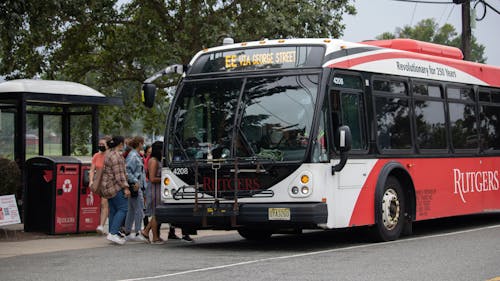Student organizations disclose their work with U. behind scenes to revise bus routes

Prior to the University’s recent change in bus routes for the fall, several Rutgers student organizations were unhappy with the proposed routes and took action in an effort to change them. Members of the Rutgers University Student Assembly, the Graduate Student Association (GSA) and the Douglass Governing Council shared their thoughts regarding the routes and the process.
Lily Juhasz, president of the Douglass Governing Council and a School of Arts and Sciences senior, said she felt the originally proposed bus system would have an overall negative impact on campus life and engagement.
"When I first found out about the new bus system, I felt intimidated for not only myself but (also) for all students, new and continuing,” she said. “Coming back to campus with a whole new bus system would be too overwhelming, and it would have been an inconvenient adjustment after such an unprecedented time. The originally proposed system also did not take in any consideration into student's safety, accessibility, comfort or convenience."
Faizali Rahim, the Assembly’s university affairs chair and a School of Engineering sophomore, also raised concerns regarding student safety, navigation and the ability for services to operate efficiently, bringing up concerns for faculty and staff as well.
Sonal Gahlawat, president of the GSA and a graduate student in the Department of Biomedical Engineering, said her main issue with the previous routes was the number of bus stops and frequency of running buses during the summer and winter semesters. She said this has been a long-running issue for graduate students beyond the pandemic, who continue on-campus activities during summer and winter breaks, unlike undergraduate students.
In order to address these concerns, the students worked together and met with Antonio M. Calcado, executive vice president for strategic planning and operations, and Henry Velez, vice president of business services, over the summer to discuss potential changes they felt could be made to the routes.
The students all said the University was very open to hearing their concerns and using their feedback to improve the routes. Juhasz said Rutgers was already working on changing the routes when they approached them with the concerns.
“They gave us updates on how they were going to change the routes, and they invited us and other student leaders from other organizations to see the new map once it had been made,” Rahim said. “(Institutional Planning and Operations) is continuing to have more meetings about possible improvements and has continued to be very open with me about these meetings.”
Additionally, Juhasz said the Douglass Governing Council and other governing councils put out surveys prior to the meetings with administrators to gather student opinions and suggestions, which the University took into consideration as well.
Some of the main concerns demonstrated by students in the Douglass Governing Council survey included getting to class on time, accessibility, safety at nighttime, a reduced number of bus stops and inconvenience on the Cook and Douglass campuses during the winter months.
Following the recent changes to the routes, which included reverting back to nine letter routes and adding back several stops, all three student representatives said they were largely satisfied with the new routes for the fall. Though, they will continue to communicate with the administration about student feedback on the bus system.
“I do know that there are some concerns about certain bus stops, such as the Henderson stop, Buell Apartments and other such stops that were cut,” Rahim said. “I am actively working with (the Residence Hall Association) to gather data and understand the situation better for these stops to see if there is something that we can do to possibly add some back.”
Gahlawat said the University has not yet given a response to her suggestion regarding the bus operations during winter and summer. She said she would like the University to prioritize graduate students as much as undergraduate students for bus considerations and to gather input from students before implementing changes in the future.
“As a scientist, I believe in hypothesis-based, driven research,” Gahlawat said. “That’s what I would like the administration to do ... send out surveys, gather data and then make a decision, not the other way around.”



